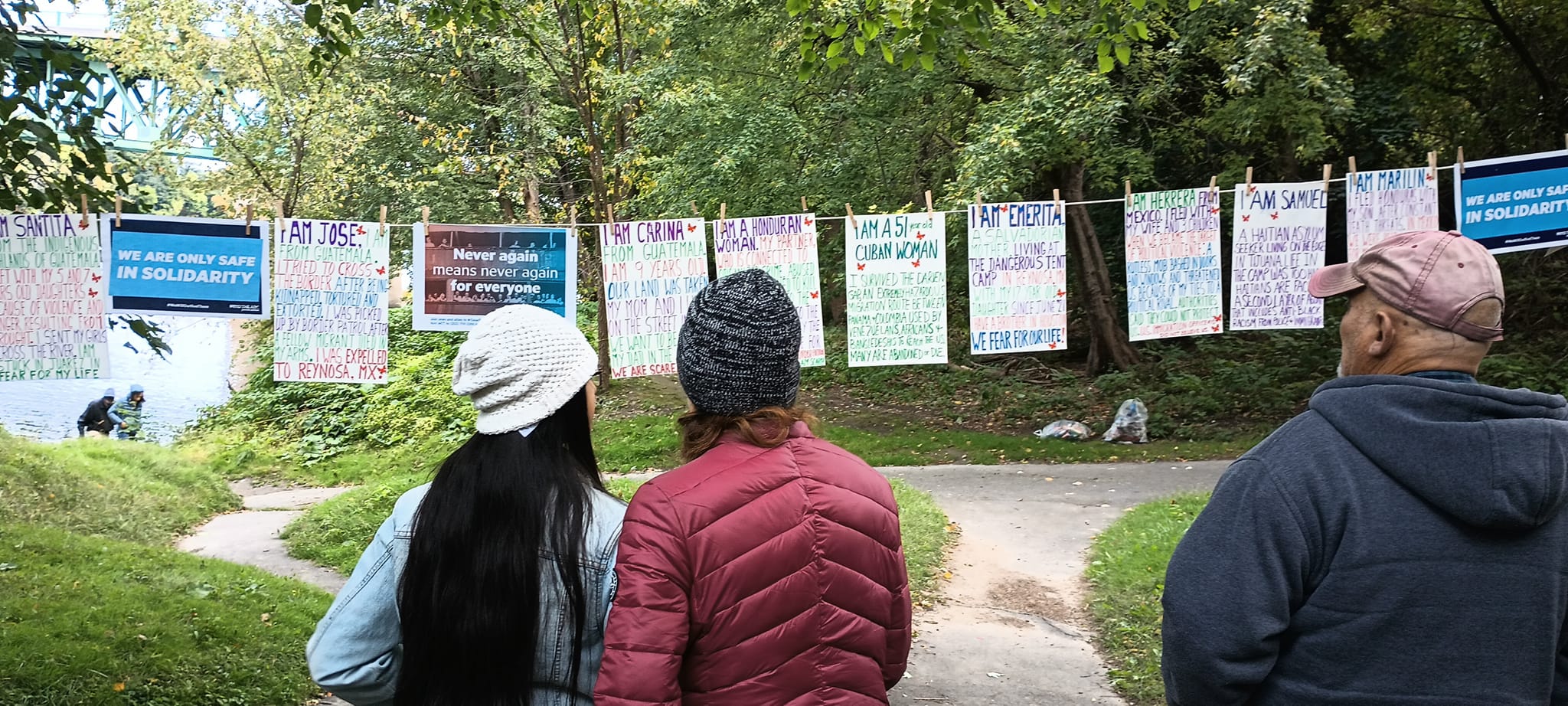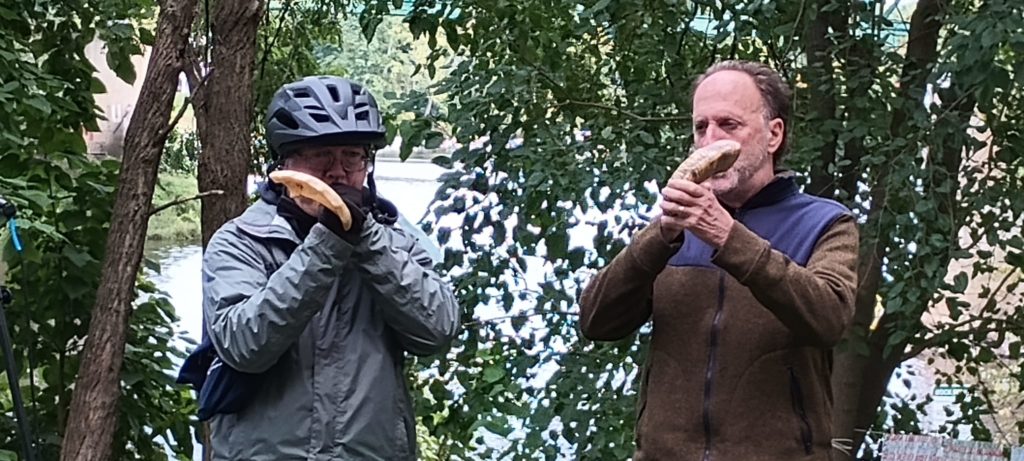Securing Safety Rally And Ritual Celebrates Immigrant Stories

People in the audience at the rally for immigration justice on October 2, read the stories collected from migrants at the border by Jewish Activists For Immigration Justice. Photo: Shel Horowitz
“I didn’t leave when they threatened my life. I left when they threatened my eight-year-old son’s life.” Jewish Activists for Immigration Justice (JAIJ) heard this—and many equally harrowing stories—during our week of witness at the US-Mexico border in 2020. At a rally and ritual for immigration justice, held on Sunday, October 2 at the Connecticut River Greenway State Park, Dina Friedman, the emcee, shared that encounter with about 100 Western Massachusetts activists and citizens attending
JAIJ has been active locally and nationally on immigration justice issues since 2019. For this interfaith event that included a Tashlich ritual (more typically held on the second day of Rosh Hashana, the Jewish New Year), the group reached out to other faiths and to immigrants themselves. The Securing Safety theme was chosen to increase awareness of the many different risks to safety threatening many communities, especially immigrants and people identified as BIPOC or LGBTQ. Specific actions included:
- Organizing a YES vote on Massachusetts ballot Question 4, to protect the right (newly passed by the legislature after 20 years of struggle) of immigrants to apply for driver’s licenses
- Urging the federal government to stop enforcing Trump-era anti-immigrant policies including Title 42 (which bars immigrants under spurious health criteria) and Remain in Mexico (officially—and ironically—known as the Migrant Protection Program)
- Supporting Haitian immigrants now living in Western Massachusetts
Members of JAIJ are drawn to immigration justice through our own Jewish heritage. Our religious texts command us to “welcome the stranger because you were strangers in Egypt.” And Jews have experienced persecution and attempted extermination throughout history, from Pharaoh more than 3000 years ago to Hitler within the memories of people still living.
Co-sponsored by local synagogues Beit Ahavah (Northampton), B’nai Israel (Northampton), Temple Israel (Greenfield), and the Social Justice committee of the Jewish Community of Amherst, the event also included Toby Bobbitt of the First Church in Amherst (United Church of Christ), a key organizer of the sanctuary effort that housed and fed Guatemalan immigrant Lucio Perez for more than three years. She noted that it was a community effort involving many other congregations of different faiths, as well as people who were not affiliated with a religious community. They could not have done it alone, she said. She concluded by saying, “As a Christian, I believe God’s love is available to everyone even ICE [Immigration and Customs Enforcement] officers.”
Rabbi Andrea Cohen Kiener of Temple Israel (Greenfield) presented the Jewish perspective on welcoming the stranger and bridging the fear-based gaps that happen through othering. “Love feels better than fear.” The best response to othering, she said, is to build community. She also led the assembly in a song,” Where You Go, I Will Go,” based on the Biblical Ruth who chose to follow her mother-in-law back to the older woman’s homeland, becoming an immigrant—and a direct ancestor of King David.
Attenders also heard personal testimony from Marie Ange Laroche, a Haitian immigrant who now works as a case worker for local Haitians through Jewish Family Services of Western Massachusetts: “20 years ago I was fleeing for my life. Those were dark and scary days… I was lucky to get connected to good legal people and be granted asylum.” Laroche said her community has an urgent need for many kinds of help, from food items and diapers to therapy services. Goods can be donated at https://www.jfswm.org/donate-goods/ and monetary contributions at https://www.jfswm.org/donate/ (please specify the donation is for the Haitian Case Management Program).
For journalist and UMass prison journalism instructor Razvan Sibii, who is an immigrant and who writes a column on immigration and incarceration for the Daily Hampshire Gazette, the hardest—and also the most rewarding—part is teaching how both to report on and empower vulnerable people. His six-point framework covers choosing what to write while balancing needs to create empathy but limit potentially harmful exposure, gaining trust and maintaining credibility, asking the right questions, fact-checking traumatic events—and even “how to deal with the waves of hate that come your way from people who…feel themselves to be vulnerable too.”
Quoting Ta-Nehisi Coates, he spoke of the need to reach those who had blocked out their view of others’ discomfort—whose lives were “suburban and endless, organized around pot roasts, blueberry pies, fireworks, ice cream sundaes, immaculate bathrooms, and small toy trucks that were loosed in wooded backyards with streams and glens.” For justice, we also need accountability, he said.
And Javier Luengo-Garrido of the ACLU, coordinator of the Western Massachusetts Yes on 4 campaign, made a passionate plea to get people out to vote, and to support the bill passed this summer to add Massachusetts to the 16 other states that allow people without legal status to take driving tests and get drivers licenses if they pass. This measure came out of more than 20 years of organizing was supported by most of the state’s sheriffs and district attorneys. It will keep our roads safer by keeping unlicensed, uninsured drivers off the roads—and it will also prevent the breakup of families when breadwinners who need to drive to their jobs get caught in the detention/deportation system if they’re caught driving without a license.
Decrying the ultra-right’s attempt to block this hard-won law, he warned that even in Massachusetts, Donald Trump received more than a million votes—and that if the anti-immigration forces succeeded in overturning the law, it would be very hard to undo. “If this law gets voted down, there is no way that the legislators handle it again.”
Luengo-Garrido urged attenders to educate people, especially since the question didn’t make it onto the ballot on time to be included in the Secretary of State’s voter handbook and is printed on the reverse side of the ballot, where many people might overlook it—and that confusingly, a yes vote is to let the law go into effect and a no vote overturns it. He is actively looking for canvassing volunteers: contact him at jluengo@aclum.org . To donate money, please visit https://secure.actblue.com/donate/vote-yes-for-safer-roads .
The event ended with a modified version of the traditional Rosh Hashanah Tashlich ritual for the new Jewish year of 5783 (which started a week earlier), led by Rabbi Riqi Kosovske of Beit Ahavah (Northampton’s Reform synagogue). Participants either walked the short distance to the dock along the Connecticut River or threw wishes, aspirations, and what they want to leave behind represented by leaves, twigs, and other natural objects) or threw written messages into a “river” made of fabric and yoga mats. The traditional sound of the shofar (an ancient musical instrument fashioned from a ram’s horn), played by Andrew Morris Friedman and Phil Korman, was heard at the start of the event and again between the speakers and the ritual.

